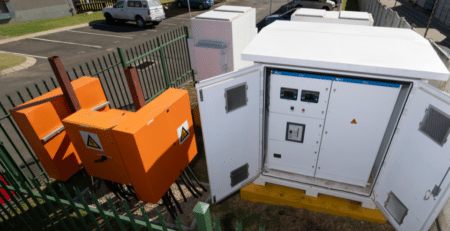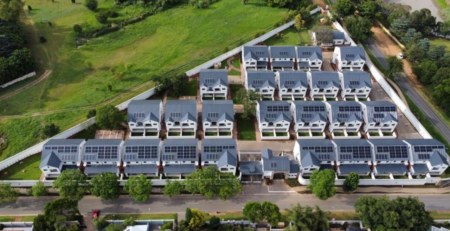Understanding solar battery backup systems: a necessity for South Africans
Even though there have been less frequent power outages, the cost of electricity continues to escalate by double-digit percentages! Solar battery backup systems are becoming a critical component in the country’s energy landscape, offering community schemes a way to ensure power continuity, reduce costs, and contribute to environmental sustainability. But how do these systems work?
Solar battery backup systems are designed to store excess energy generated by solar panels during the day. Here’s how the process works:
- Solar energy generation: Solar panels convert sunlight into direct current (DC) electricity. The DC current is converted by an inverter into usable AC current which is used to power lights and appliances in real-time.
- Energy storage: Any surplus energy that isn’t immediately consumed is transferred to the battery storage system. These batteries store the energy as DC electricity, which can be used later when the sun isn’t shining, such as during the night or during power outages.
- Energy usage: When energy is needed, the stored electricity is converted from DC to alternating current (AC) by an inverter, making it usable for household or commercial applications.
- Grid integration: Some advanced systems are integrated with the national grid, allowing users to sell excess energy back to the grid (where applicable) or draw power from the grid during periods of high demand.
Why solar battery backup systems are essential in South Africa
South Africa’s energy landscape is characterised by frequent power outages and rising electricity tariffs, making energy security a top priority for households. Solar battery storage systems provide a reliable solution, not only by ensuring power availability during grid failures but also by offering a significant financial advantage.
Our battery storage solutions allow community schemes to maximise their solar power usage by storing excess energy. Instead of letting extra solar energy go to waste, our solutions allow you to use it to reduce your reliance on the grid every day. In addition, these systems allow Home Owners Associations (HOAs) or Sectional Title Schemes to implement peak shift or peak shaving strategies, drawing on stored energy during peak demand times when electricity tariffs are higher. This approach reduces costly high-demand charges and reliance on the grid, leading to significant savings for the scheme.
By using stored solar energy effectively, community schemes can cut costs, lower electricity bills, and create long-term savings, ensuring more financial security and energy independence.
Environmental impact of solar and battery backup systems
In addition to their practical benefits, solar battery backup systems have a positive environmental impact. By harnessing renewable solar energy and reducing reliance on fossil fuels, these systems help lower greenhouse gas emissions. Over time, the widespread adoption of solar energy can contribute to a reduction in the carbon footprint of individuals and businesses alike, promoting a more sustainable future for all.
READ: Energy independence bolted onto your solar PV solution
Solar battery backup systems are no longer just a luxury—they’re a necessity in South Africa’s current energy climate. By investing in these systems, users can ensure energy security, reduce costs, and make a positive impact on the environment. Our partner, Bright Light is at the forefront of this energy revolution, providing South Africans living in community schemes with the tools they need to power their lives sustainably and efficiently.
For more information on how solar can improve your life and the value of your property, reach out to one of our experienced sales members today.





